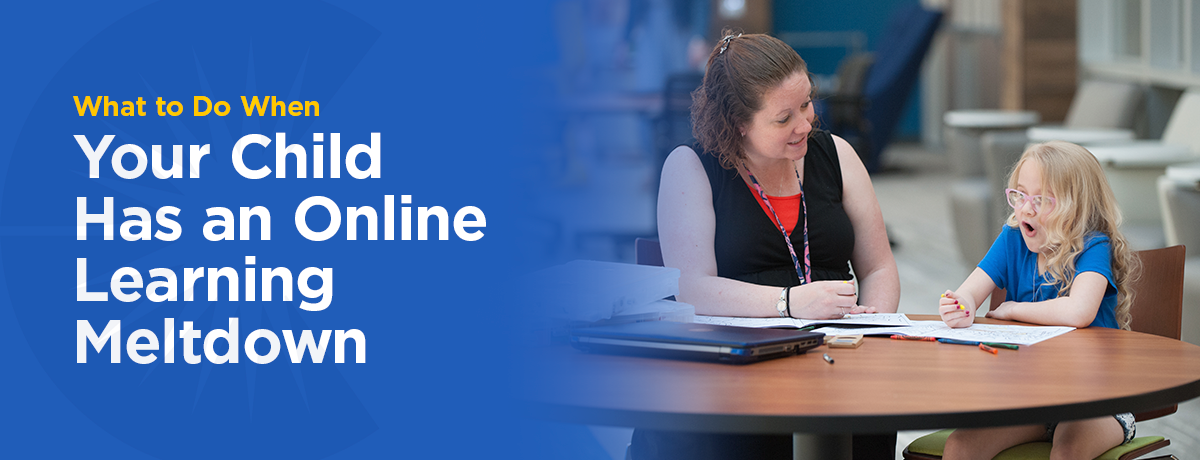Tantrums can be frustrating for kids and parents alike and often occur because of intense emotions about a situation. For example, student meltdowns were often common during the COVID-19 pandemic when online schooling forced many children to socially distance. Even when children expect and enjoy doing schoolwork online, there can still be times when kids become overwhelmed and have a meltdown over online learning.
Let’s discover why kids experience temper tantrums so you can learn how to help your child navigate an online learning meltdown and get them back to growing and having fun in the virtual classroom.
Tantrums and Meltdowns — Why They Happen
Why do tantrums happen? Parents may view tantrums as just a frustration or inconvenience, yet there is a lot to learn about your child from a meltdown. Some core reasons children have tantrums include:
1. Kids Are Frustrated
Kids may be frustrated because they are uncomfortable, tired, or hungry. Kids could also have a tantrum when they want their parent or a toy to act in a certain way. It takes time for young children to understand that they cannot always manipulate others into doing what they want.
2. Kids Can’t Express Their Feelings
Because tantrums usually occur in children ages 1 to 3, they are often a way for kids to express the emotions they don’t yet know how to name. A tantrum may be the only way your little one can deal with sadness and anger.
3. Kids Want Independence
A desire for more independence can also lead to meltdowns. When they can’t get what they want, like a snack or toy, or do what they wish to, toddlers may resort to having a meltdown.
Student Meltdowns Happen Too
Although tantrums primarily occur among younger children, older school-age kids can also have them. Here are a few of the most common reasons why student meltdowns occur:
1. Students Don’t Understand Assignments
Students sometimes have meltdowns because of complex assignments in school. If course material is particularly challenging or the child feels behind their classmates, they could turn to a tantrum to express their frustration.
2. Students Need Help
Sometimes students need help on an assignment but are too afraid to ask, or think finding solutions on their own will take too much time. Whatever the reason, students often don’t know how to de-escalate their feelings when they need help.
3. Students Aren’t Getting Enough Sleep
According to the Sleep Foundation, sleep directly affects mood and happiness, impacts a child’s ability to pay attention, and influences academic performance. If kids are having tantrums during or because of school, poor sleep could be the culprit.
4. Students Struggle With Perfectionism
Perfectionism is emotionally draining. Kids might feel like they need to achieve specific grades to be successful, please their parents, or feel proud of themselves. Kids might not know healthy ways to cope with getting a grade they didn’t want.
5 Tips to Help Your Child Through a Meltdown
Helping your kids interpret and process their emotions to become emotionally resilient is an important part of parenting. You can give your child the tools to face challenges later on by helping them work through tantrums. Follow these tips on what to do when your child has a meltdown:
1. Acknowledge Your Child’s Feelings
Intense emotions can be difficult for children of all ages to express. Identifying those feelings in your child can help you determine strategies for helping your child work through them.
- Let your child express how they feel: Acknowledge to your child that sadness and disappointment are normal feelings. Allow your child to express those feelings so they understand these are completely normal.
- Be patient: Healthy emotional expression requires practice. Try not to become frustrated if a tantrum reoccurs, even for the same reason.
- Regulate your own feelings: It is crucial to model healthy emotional expression to your child so that they learn how to do it themselves. Show your child that taking a deep breath, talking through your feelings, or brainstorming solutions to your problem is better than a meltdown.
- Take thoughtful action: Develop a clear action plan for inappropriate outbursts. First, tell them clearly what they should stop doing. Then implement reasonable consequences like quiet time to allow them to compose themselves.
2. Be Flexible When You Can

When a student has a meltdown during school hours, it can easily disrupt their entire day. Sometimes their emotions distract them from their schoolwork and make it difficult to accomplish anything. It can be beneficial to allow your child a break from schoolwork to decompress.
It’s much easier to help your child return to calm when you can take all the time you need and step away from the screen. Commonwealth Charter Academy (CCA) provides flexible schedules so students can work at their own pace through their virtual learning curricula. Our personalized learning program is adaptable, so you can tailor your child’s schedule to their unique needs and help them learn at their best pace.
3. Make Sure Everyone Is Getting Enough Sleep
A lack of sleep is a major cause of child tantrums and meltdown behavior. An inadequate amount of sleep can impact your child’s mental health and cause anxiety and mood swings. Here are some common causes of sleep deprivation in students:
- Too much screen time: Exposure to screens close before bedtime disrupts the sleep cycle and can keep little brains awake longer. Turn all screens off before bed to help your child relax.
- Worry: Anxiety could also be keeping your child up at night. Try to identify the cause of their stress, like problems with schoolwork or friends, and help them develop solutions. You can also create a nighttime routine that helps them wind down.
- Too many extracurricular activities: Soccer, piano class, and swim lessons are all great activities. However, if all your kid’s extracurricular activities leave them little time to do schoolwork and get plenty of sleep, they are too busy. Consider limiting their activities to help them get better quality sleep.
4. Set up a Calming Corner or Space
Sometimes the best way to help your child during a meltdown is to give them a space where they can retreat and self-regulate their emotions in seclusion. A special corner can help your child control their feelings in an area that makes them feel safe. You can fill their space with objects and images that bring your child peace, like:
- Books
- Favorite toys
- Posters of favorite characters
- Soft blankets and pillows
- A kaleidoscope, bubbles, or other sensory toys
5. Try Talking Your Child Through the Meltdown
While reasoning with a toddler about why they should stop having a meltdown may not always work, parents can talk to their child in other ways to help them regain control:
- Suggest solutions: As you acknowledge your child’s feelings, suggest solutions to their problem. If they are hungry or tired, find them a snack or give them time to take a nap. If difficult schoolwork is the issue, reassure them that you are right beside them to work through the problem.
- Show you are on their side: Telling your child that you understand them and are present can go a long way in de-escalating a tantrum. Repeating positive expressions over time will help your child learn to trust you with their feelings.
- Give your child an “out” to calm them down: Depending on your child’s needs, other forms of expression could give them the emotional release they need to regulate their emotions. You can provide music, let them go for a walk, or let them hit a punching bag. These coping strategies are a much healthier way to deal with emotions than indulging in a meltdown.
Overcoming Challenges With Schooling
As a cyber charter school, CCA makes a conscious effort to provide flexible, personalized learning for all students K-12. We create a safe and dynamic learning environment and dedicated support to help your child excel in their individual goals. We understand each child has unique needs, so we created a flexible program where kids can learn at their own pace and pursue other opportunities like extracurricular activities and hobbies.
Contact us today and learn why parents choose CCA as their public cyber charter school.




